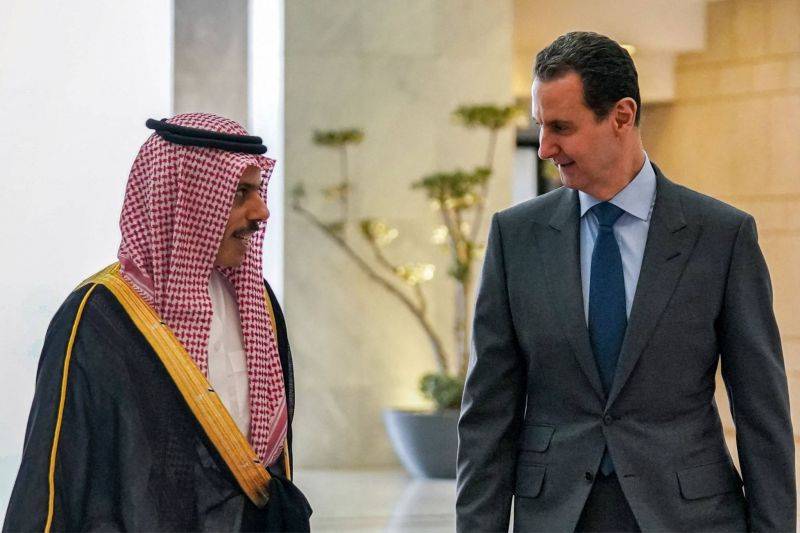
Saudi Foreign Minister Faisal bin Farhan, left, and Syrian President Bashar al-Assad in Damascus on April 18, 2023. (Credit: Syrian presidency Facebook page/AFP)
Bashar al-Assad won the war in 2016, when Iranian militiamen and Russian warplanes helped recapture east Aleppo from the opposition.
Since then, the balance of power on the ground has constantly evolved in his favor, allowing him to regain control of nearly two-thirds of the country.
Assad has adopted for nearly seven years the same strategy of gaining ground wherever he can; not giving in, including to his allies; and waiting patiently for his yesterday’s enemies to rehabilitate him one by one in the name of the “realpolitik.”
The Syrian president has nothing to offer. He rules over a fragmented country that lies in ruins. He does not have the means to take back the territories that are beyond his control. He does not intend to facilitate the return of the 13 million refugees and displaced persons, mostly Sunnis, who have fled the war and his regime equally, and whom he continues to perceive as a threat.
He cannot get rid of either the Russians or the Iranians, who have infiltrated his regime at all levels. He cannot negotiate anything, since negotiation implies making compromises, even minimal ones, which he has always refused to do even when he has been in an extremely weak position.
It is not in his DNA. In 50 years of dominance in Syria, the Assads, father and son, have conceded only once: to Kissinger, in 1974, to ensure the survival of their regime.
The Syrian president does not discuss, he uses blackmail endlessly, whether the issue at hand is refugees; captagon, of which his country has become the world's main producer; or "terrorists," whom he has been able to use whenever beneficial to him.
Bashar al-Assad has nothing to offer and yet Mohammed bin Salman (MBS) is rolling out the red carpet for his grand return to the “Arab house.” MBS wants to turn Syria into an “Arab question” again.
He wants to force the regime to “take back” the refugees, to move away from the “clutches” of the Iranians, or to stop exporting its captagon to the Gulf.
The Saudi crown prince has legitimate reasons for fulfilling his goals. But it is naive to think that he will succeed in achieving them by rehabilitating — without preconditions — a president who has been waiting for this to happen. The kingdom had already tried to play this card in the past — and it was a failure on each occasion.
MBS presents himself today as a new man. A leader who has matured and learned from his “mistakes.” He wants to move past his disastrous intervention in Yemen, the assassination of Jamal Khashoggi and the time his country held Saad Hariri hostage.
He wants to become the undisputed leader of the region, the one who will be seen as a role model for the entire Arab world, the one who is able to bring Iraq and Syria back into his fold, and to make peace with the Iranians.
The crown prince is transforming his country at a speed and scale rarely seen in recent history. Saudi Arabia, as we have known it, no longer exists. One must be aware of this without turning a blind eye to the repression — also unprecedented — that is accompanying this revolution.
But on the regional scene, MBS gives the feeling that he is going from one extreme to another: from all-out war to peace without conditions. He is withdrawing from Yemen, which is a good thing, but he is letting the Houthis continue the conflict.
He is allowing Iran to strengthen its positions on the ground and to continue its nuclear program without risking regional isolation. He is offering Iran's supreme leader, Ali Khamenei, and Assad stability, which they have not been able to win so far, despite all their battles.
Certainly, MBS can always withdraw from the agreement if the Iranians do not respect their commitments. Admittedly, his concessions are for the moment mainly symbolic, and nothing indicates that he intends to finance the Syrian reconstruction (which the Caesar law prevents anyway).
Certainly, it is necessary for him to negotiate with his enemies and to avoid, at all costs, a major confrontation with catastrophic consequences for the whole region.
But between war and peace, there are a host of possibilities that the crown prince seems to ignore.
By letting Iran pursue its regional destabilization enterprise and, above all, by rehabilitating a leader who bombed and gassed his own people, how can MBS hope to usher in a new era in the region? Unless this era is — following on from what he showed historically — a particularly counter-revolution era and heralds the permanent closure of the Arab Spring chapter.
This article was originally published in French by L'Orient-Le Jour. Translation by Joelle El Khoury.